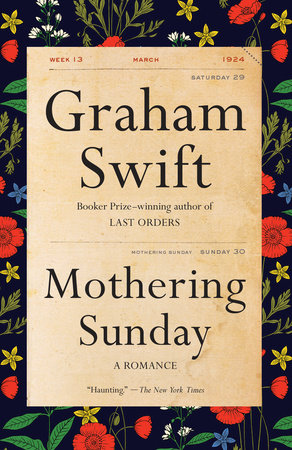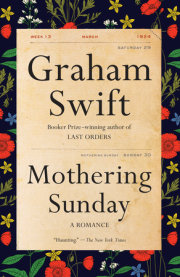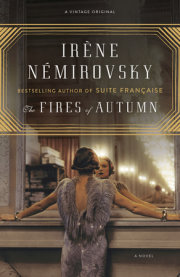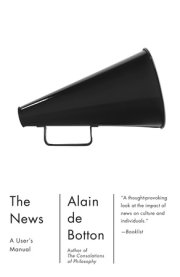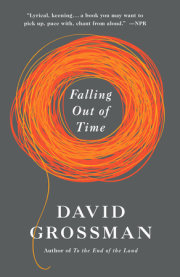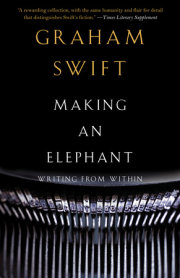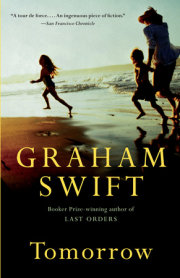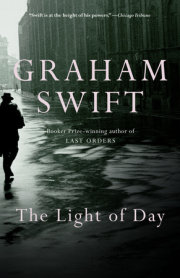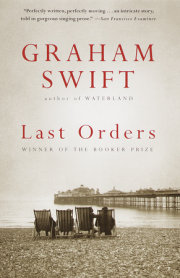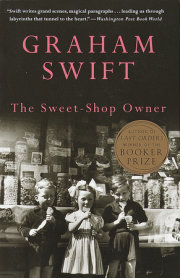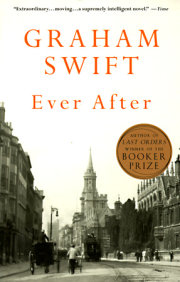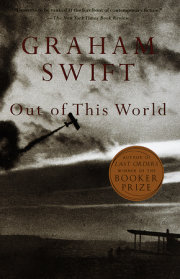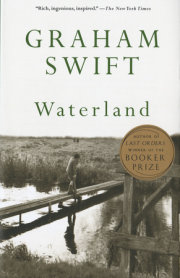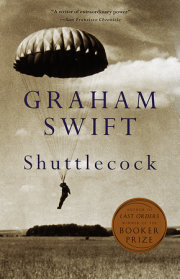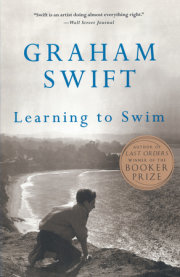ONCE UPON A TIME, before the boys were killed and when there were more horses than cars, before the male servants disappeared and they made do, at Upleigh and at Beechwood, with just a cook and a maid, the Sheringhams had owned not just four horses in their own stable, but what might be called a “real horse,” a racehorse, a thoroughbred. Its name was Fandango. It was stabled near Newbury. It had never won a damn thing. But it was the family’s indulgence, their hope for fame and glory on the racecourses of southern England. The deal was that Ma and Pa—otherwise known in his strange language as “the shower”—owned the head and body and he and Dick and Freddy had a leg each.
“What about the fourth leg?”
“Oh the fourth leg. That was always the question.”
For most of the time it was just a name, never seen, though an expensively quartered and trained name. It had been sold in 1915—when he’d been fifteen too. “Before you showed up, Jay.” But once, long ago, early one June morning, they’d all gone, for the strange, mad expedition of it, just to watch it, just to watch Fandango, their horse, being galloped over the downs. Just to stand at the rail and watch it, with other horses, thundering towards them, then flashing past. He and Ma and Pa and Dick and Freddy. And—who knows?—some other ghostly interested party who really owned the fourth leg.
He had a hand on her leg.
It was the only time she’d known his eyes go anything close to misty. And she’d had the clear sharp vision (she would have it still when she was ninety) that she might have gone with him—might still somehow miraculously go with him, just him—to stand at the rail and watch Fandango hurtle past, kicking up the mud and dew. She had never seen such a thing but she could imagine it, imagine it clearly. The sun still coming up, a red disc, over the grey downs, the air still crisp and cold, while he shared with her, perhaps, a silver-capped hip flask and, not especially stealthily, clawed her arse.
—
BUT SHE WATCHED him now move, naked but for a silver signet ring, across the sunlit room. She would not later in life use with any readiness, if at all, the word “stallion” for a man. But such he was. He was twenty-three and she was twenty-two. And he was even what you might call a thoroughbred, though she did not have that word then, any more than she had the word “stallion.” She did not yet have a million words. Thoroughbred: since it was “breeding” and “birth” that counted with his kind. Never mind to what actual purpose.
It was March 1924. It wasn’t June, but it was a day like June. And it must have been a little after noon. A window was flung open, and he walked, unclad, across the sun-filled room as carelessly as any unclad animal. It was his room, wasn’t it? He could do what he liked in it. He clearly could. And she had never been in it before, and never would be again.
And she was naked too.
March 30th 1924. Once upon a time. The shadows from the latticework in the window slipped over him like foliage. Having gathered up the cigarette case and lighter and a little silver ashtray from the dressing table, he turned, and there, beneath a nest of dark hair and fully bathed by sunshine, were his cock and balls, mere floppy and still sticky appendages. She could look at them if she liked, he didn’t mind.
But then he could look at her. She was stretched out naked, except for a pair—her only pair—of very cheap earrings. She hadn’t pulled up the sheet. She had even clasped her hands behind her head the better to look at him. But he could look at her. Feast your eyes. It was an expression that came to her. Expressions had started to come to her. Feast your eyes.
Outside, all Berkshire stretched out too, girded with bright greenery, loud with birdsong, blessed in March with a day in June.
He was still a follower of horses. That is, he still threw money away on them. It was his version of economising, to throw money away. For nearly eight years he’d had money for three, in theory. He called it “loot.” But he would show he could do without it. And what the two of them had been doing for almost seven years cost, as he would sometimes remind her, absolutely nothing. Except secrecy and risk and cunning and a mutual aptitude for being good at it.
But they had never done anything like this. She had never been in this bed before—it was a single bed, but roomy. Or in this room, or in this house. If it cost nothing, then this was the greatest of gifts.
Though if it cost nothing, she might always remind him, then what about the times when he’d given her sixpences? Or was it even threepences? When it was only just beginning, before it got—was it the right word?—serious. But she would never dare remind him. And not now anyway. Or dare throw at him the word “serious.”
He sat on the bed beside her. He ran a hand across her belly as if brushing away invisible dust. Then he arranged on it the lighter and ashtray, retaining the cigarette case. He took two cigarettes from the case, putting one in her own proffered, pouting lips. She had not taken her hands from the back of her head. He lit hers, then his. Then, gathering up the case and lighter to put on the bedside table, he stretched out beside her, the ashtray still positioned halfway between her navel and what these days he would happily, making no bones about it, call her “cunt.”
Cock, balls, cunt. There were some simple, basic expressions.
It was March 30th. It was a Sunday. It was what used to be known as Mothering Sunday.
—
“WELL, you have a gorgeous day for it, Jane,” Mr. Niven had said as she brought in fresh coffee and toast.
“Yes, sir,” she’d said and she’d wondered quite what he meant by “it” in her case.
“A truly gorgeous day.” As if it were something he had generously provided. And then to Mrs. Niven, “You know, if someone had told us it was going to be like this, we might as well have all packed hampers. A picnic—by the river.”
He said it wistfully, yet eagerly, so that, putting down the toast rack, she’d thought for an instant there might actually be a change of plan and she and Milly would be required to pack a hamper. Wherever the hamper
was, and whatever they were supposed to put in it at such inconsiderate notice. This being
their day.
And then Mrs. Niven had said, “It’s March, Godfrey,” with a distrusting glance towards the window.
Well, she’d been wrong. The day had only got better.
And anyway the Nivens had their plan, on which the weather could only smile. They were to drive to Henley to meet the Hobdays and the Sheringhams. Given their common predicament—which only occurred once a year and only for a portion of one day—they were all to meet for lunch at Henley and so deal with the temporary bother of having no servants.
It was the Hobdays’ idea—or invitation. Paul Sheringham was to marry Emma Hobday in just two weeks’ time. So the Hobdays had suggested to the Sheringhams an outing for lunch: an opportunity to toast and talk over the forthcoming event, as well as a solution to Sunday’s practical difficulty. And then because the Nivens were close friends and neighbours of the Sheringhams and would be honoured guests at the wedding (and would have the same difficulty), the Nivens—as Mr. Niven had put it to her when first notifying her of these arrangements—had been “roped in.”
This had all made clear one thing she knew already. Whatever else Paul Sheringham was marrying, he was marrying money. Perhaps he had to, the way he got through his own. The Hobdays would be paying in two weeks’ time for a grand wedding, and did you really need to celebrate a forthcoming celebration? Not unless you had plenty to spare. It might demand nothing less than champagne. When Mr. Niven had mentioned the hamper he had perhaps been wondering how much the Hobdays’ liberality could be relied on or how much the day might involve his own pocket.
But that the Hobdays had plenty to spare pleased her. It had nothing to do with her, but it pleased her. That Emma Hobday might be made of five-pound notes, that the marriage might be an elaborate way of obtaining “loot,” pleased or, rather, consoled her. It was all the other things it might entail that—even as Mr. Niven explained about the “roping in”—gnawed at her.
And would Mister Paul and Miss Hobday be joining the party themselves? She couldn’t really ask it directly, vital as it was to her to know. And Mr. Niven didn’t volunteer the information.
“Would you mention these arrangements to Milly? None of it of course need affect—your own arrangements.”
It was not often that he had the occasion to say such a thing.
“Of course, sir.”
“A jamboree in Henley, Jane. A meeting of the tribes. Let’s hope we have the weather for it.”
She wasn’t quite sure what “jamboree” meant, though she felt she had read the word somewhere. But “jam” suggested something jolly.
“I hope so too, sir.”
—
AND NOW they clearly had the weather for it, and Mr. Niven, whatever his earlier misgivings, was indeed getting rather jolly. He was going to be driving himself. He had already announced that they might as well set off soon, so they could “pootle around” and take advantage of such a lovely morning. He wouldn’t, apparently, be calling on Alf at the garage, who—for the right sum—could become a convincing chauffeur. In any case, as she’d observed over recent years, Mr. Niven liked driving. He even preferred the pleasure of driving to the dignity of being driven. It gave him a boyish zest. And as he was always saying, with a whole variety of intonations, ranging from bluster to lament, times were changing.
Once upon a time, after all, the Nivens would have met the Sheringhams at Sunday service.
“Tribes” had suggested something hot and outdoors. She knew it was to be the George Hotel in Henley. It was not to be a picnic. And it might well have been a day, since it was still March, of evil gales, even snow. But it was a morning like a morning in summer. And Mrs. Niven left the table to go up to get herself ready.
She couldn’t ask, even now with Mr. Niven conveniently alone, “Would Miss Hobday and…?” Even if it sounded like just a maid’s idle curiosity. Wasn’t the coming wedding the only current talking-point? And she certainly couldn’t ask, “If not, then what other separate arrangements might the two of them have in mind?”
She didn’t think that if she were one half of a betrothed couple—or at least Paul Sheringham’s half—she would want, two weeks before their wedding, to attend a jamboree in Henley to be fussed over by the older generation (by what he might have called—she could see him speaking with a cigarette in his mouth and wincingly screwing up his eyes—“three bloody showers together”).
But in any case, if she got no further information, it still left the problem that was peculiarly hers on this day, as Mr. Niven knew, of what to do with it. Today it was painfully peculiar. The gorgeous weather didn’t necessarily help at all. It only seemed—with two weeks to go—to deepen a shadow.
She was going to say to Mr. Niven, when the moment came, that if he—if he and Mrs. Niven—didn’t mind, she might not “go” anywhere. She might just stay here at Beechwood and read a book if that was all right—“her book” as she might put it, though it belonged to Mr. Niven. She might just sit somewhere in the sunshine in the garden.
She knew that Mr. Niven could only approve of such a harmless suggestion. He might even think it was a rather appealing image. And of course it would mean she’d be ready to resume her duties at once, whenever they returned. She could find something to eat in the kitchen. Milly, before she left, might even make her a sandwich. She could have her own “picnic.”
And it might even have happened just like that. The bench in the nook by the sundial. Bumblebees tricked by the weather. The magnolia tree already loaded with blossom. Her book on her lap. She knew which book it would be.
So—she would put the idea to Mr. Niven.
But then the telephone had rung and—it being one of her numberless duties—she’d hastened to answer it. And her heart had soared. That was a phrase you read in books, but it was sometimes actually true of what happened to people. It was true then of herself. Her heart had soared, like some stranded heroine’s in a story. Like the larks she would hear in a little while, trilling and soaring high in the blue sky, as she pedalled her way to Upleigh.
But she’d been careful to say, quite loudly, into the receiver and with her best answering-the-telephone voice that was both maid-like and somewhat queenly, “Yes, madam.”
Copyright © 2017 by Graham Swift. All rights reserved. No part of this excerpt may be reproduced or reprinted without permission in writing from the publisher.

